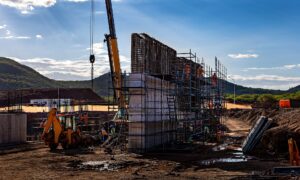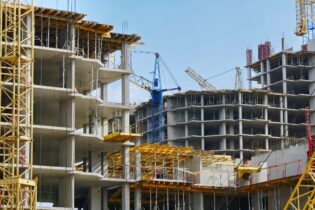The recovery of SA’s construction industry has slowed, according to the Afrimat Construction Index.
Afrimat, the JSE-listed open pit mining company providing industrial minerals, bulk commodities and construction materials, has released the findings of the Afrimat Construction Index (ACI) for the fourth quarter of 2021. The ACI is a composite index of the level of activity within the building and construction sectors, and is compiled by economist Dr Roelof Botha on behalf of Afrimat. The ACI staged a remarkably swift recovery from the COVID-19 induced slump that occurred during the second quarter of 2020, increasing by 74% within only two quarters. Since then, however, progress has been muted, due mainly to a slow rollout of the government infrastructure programme and a slowdown in commercial building. A year-on-year improvement of 0.8% was nevertheless realised in the fourth quarter of 2021 and the improvement over the fourth quarter of 2019 (pre-COVID-19) stands at 1.3%. An encouraging feature of the latest ACI is the continued sterling performances of the values of hardware retail sales and wholesale sales of construction materials, which are 60% and 55% higher, respectively, than in the base year (2011). These two key indicators of construction sector activity have also recorded real growth rates of 8% and 10%, respectively, since the fourth quarter of 2019 (pre-COVID-19). Two other indicators that are at higher levels than two years ago are building material sales and employment in construction. It is also encouraging that a majority of the indicators recorded positive growth rates on both a quarter-onquarter and a year-on-year basis. Unfortunately, Statistics South Africa (Stats SA) data on value added by the construction sector remains well below pre-COVID-19 levels, in sharp contrast to all of the other indicators. This discrepancy suggests that Stats SA may be underestimating the contribution to construction activity made by the informal sector. It is also The shining stars of the ACI during the fourth quarter of 2021 (compared to the third quarter) were construction sector salaries, hardware retail sales, employment, and the value of building plans passed in the country’s larger municipalities. According to Dr Botha, the receding fourth wave of COVID-19 infections may pave the way for significantly higher levels of construction sector activity during 2022. “Unfortunately, the war in Ukraine has caused a spike in the oil price, which will continue to put pressure on domestic inflation and probably lead to more interest rate hikes by the South African Reserve Bank”. Botha points out that the economy is still plagued by an absence of excessive demand and private sector credit extension remains on a downward trajectory. “Hopefully, the Monetary Policy Committee will realise that the current pressure on inflation is driven purely by cost-push factors that cannot be controlled by monetary policy and not over-react by returning to a stringent policy approach,” says Botha.Encouraging that a majority of the indicators recorded positive growth rates on both a quarter-onquarter and a year-on-year basis. Unfortunately, Statistics South Africa (Stats SA) data on value added by the construction sector remains well below pre-COVID-19 levels, in sharp contrast to all of the other indicators.
This discrepancy suggests that Stats SA may be underestimating the contribution to construction activity made by the informal sector. Another point of concern is the continued delays in finalising public sector contracts for construction tenders. One example is the backlog in procurement being experienced by the South African Roads Agency Limited (SANRAL). “Unless government acts swiftly to make good on its repeated promises to remove unnecessary bureaucratic obstacles facing the private sector, the repair and expansion of the country’s infrastructure will continue to be stalled,” warns Botha. On a positive note, Botha lauds a number of key policy initiatives announced in this year’s State of the Nation Address (SONA) and National Budget, especially the lowering of the corporate tax rate, the stabilisation of the public debt / gross domestic product (GDP) ratio and the promised new emphasis on public/private partnerships with infrastructure-related projects. “Against the background of an improvement in the country’s fiscal metrics, balance of payments stability and the stated government objective of closer cooperation with the private sector, further recovery of the construction sector may realistically be expected.” He notes that during the current fiscal year, public sector infrastructure expenditure has increased by an impressive 22%, with an increase of more than 11% earmarked in the 2022/23 fiscal year. “The country’s construction sector stands to expand from these increases, with further gains for the ACI on the cards in 2022. The table show the composition of government infrastructure spend in the current fiscal year.” Afrimat’s CEO, Andries van Heerden, says that aside from the obvious relief that the dissipation of COVID19 and the easing of lockdowns has brought, the Group’s diversification strategy ensures that Afrimat continues to operate optimally. He indicates that Afrimat continues to keep abreast of impacts from external factors such as the local economy, swings in commodity prices, and more recently, geopolitical tensions, and manages and mitigates these as best possible. “In addition, our unwavering attention to ensuring efficiencies and diligent execution across all operations, strict cash management, mindful capital allocation and focus on business development is something that we have honed over the years and adds to our drive for a well-balanced and diversified portfolio of assets. As always, Afrimat is well positioned to take advantage of any uptick in the construction sector, which we hope will indeed come to fruition in 2022. The recent uptick in the iron ore price also certainly helps to reduce debt and ensures that we continue to have a strong balance sheet.” *Press Release by Afrimat






